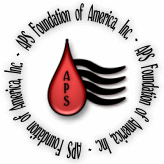Rare condition often overlooked
Rare condition often overlooked
By Shannon Farr
Saturday, June 30, 2007
Two Fairchance sisters with a blood-clotting disorder suffered through years of misdiagnoses along with disabling symptoms and the indignity of being told repeatedly their problems were all "in their head."
Robin Gibson, 45, and her sister, Darla Pardo, 43, were recently diagnosed with antiphospholipid antibody syndrome, or APS.
"Because of the disorder I had a stroke in my brain and lost a lot of my vision," Gibson said.
She is no longer able to drive a car because of her poor vision.
Gibson and her sister have suffered recurring symptoms since childhood.
Symptoms include seizures and complications from holes in the heart valve.
APS causes vein and artery blood clots, multiple miscarriages and strokes in many people, said Dr. Thomas Ortel, of Duke University in Durham, N.C.
He specializes in hematology, has treated hundreds of patients with blood-clotting disorders. Ortel is researching the genetically inherited characteristics associated with APS.
When Gibson suffered her first stroke, it was misdiagnosed as a migraine and she was sent home to begin aspirin therapy.
The disease is often misdiagnosed as a migraine, potassium deficiency or depression, said
Christina Pohlman, 35, co-founder of APS Foundation of America Inc. She was diagnosed with APS six years ago after years of being misdiagnosed.
More women than men suffer from the syndrome, Pohlman said.
Gibson suffers from acute renal failure, and she blames doctors for her and her sister's prolonged suffering.
"Most people are told that it's in their head when they go to the doctor to get help," Gibson said.
APS is detected through blood tests and scanning the body for clots, said Dr. Gale McCarty, associate staff member at Georgetown Hospital in Washington. As a specialist in rheumatology and immunology, she introduced APS research at the hospital in 1982.
"The syndrome is horribly underdiagnosed," McCarty said.
"Half of the 1.5 million lupus patients nationwide suffer from APS and many more are not diagnosed yet," Pohlman said.
APS affects each person differently. Some will have the syndrome by itself, while others will suffer from related disorders as well.
"Robin struggles to keep in step with her everyday routine and continues to suffer from strokes," Pohlman said.
Gibson's sister, Pardo, is in The Uniontown Hospital in Uniontown struggling with blood clots, kidney failure, liver disease and intensive heart disease, Gibson said. All of the health ailments are associated with APS.
"It's a balancing act that really makes you keep your life in check," Pohlman said. "You could have a stroke at any time."
The number of people who have the syndrome is unknown, said Sarah Church, informational specialist at the Genetic and Rare Disease Information Center.
"When I was first diagnosed, I felt like I was the only person in the world with the disease," Pohlman said.
There's not enough people in her area with the disorder to start a support group. People around the nation are pulling together to hold conferences, visit doctors, create a quarterly handout, and chat on-line with people who may have the disease, Pohlman added.
The theme of the June APS awareness month is "Get in the Flow."
© 2007 by The Tribune-Review Publishing Co.
http://www.pittsburghlive.com/x/pittsburghtrib/s_515444.html
Labels: america, anticoagulant, antiphospholipid antibody syndrome, APS, APS Foundation, APSFA, clot, DVT, Heart Attack, hughes syndrome, Lupus, migraine, Miscarriage, pe, stroke, thrombosis, usa



0 Comments:
Post a Comment
Subscribe to Post Comments [Atom]
<< Home